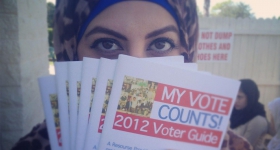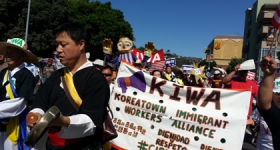UNLIKE LONG DUK DONG in Sixteen Candles and my childhood classmate Kil-Her, I was spared the angst of having a name that invited peer torment. Nor was I saddled with a name that, like Gogol Ganguli's in The Namesake, was inherently non-conducive to sexual foreplay.
I was named Angela, supposedly after my aunt's Italian American best friend from Philadelphia. My Korean immigrant parents, who arrived in the late 1 970s, also gave me a Korean middle name - Megyung, meaning "pretty landscape" - which I embraced only upon joining a radical leftist organization in college.
Now I'm 31 and my generation is producing kids - lots of them. Asian Americans constitute 4 percent of the US population, according to the US Census, yet account for one of the largest portions of the last decade's 83 percent population increase (second to Latinos).
Among the main perpetrators of this baby boom are politically active Asian Americans who name their broods after revolutionaries. For such Asian Americans, naming kids after inspirational figures is a way to memorialize our communities' struggles and triumphs in the US sociopolitical landscape. Many choose names that enshrine a sense of history, a moment in time, a conviction or a social vision.
Filipino American Peter Swing gave his baby son, Gianni, the middle name Lenin in honor of the Russian Marxist revolutionary Vladimir llyich Lenin. Swing, now a communications director for the Asian Law Caucus in San Francisco, "saw the reality of the US military abroad" while serving on two tours of duty, one in Kosovo and one two weeks after 9/1 1 , prior to his honorable discharge (before the Iraq war began). His son's name reflects convictions formed during his postmilitary political awakening at the University of California, Berkeley, sparked by Swing's mentor, Asian American studies Professor Ronald Takaki.
Wayie Ly and Johnny Cabaddu, San Francisco Bay Area activists and media makers, wanted to honor a certain Asian American living legend in naming their baby. Their toddler daughter bears the name of Yuri Kochiyama - who is the couple's mentor, a family friend and the subject of their documentary, Freedom Fighters with a twist. In an act they describe as both personal and political, Ly and Cabaddu chose the name Yurika. They agreed that this name, which phonetically evokes Gold Rush era exclamations, was to signify the 87-year-old activist's humility and her passion for civil and human rights.
Daniel Kim, community organizer and English professor, and his partner, Cheryl Higashida, had no difficulty agreeing to name their baby: Nathanael Kunio Jaewon Kim. This name encapsulates the Japanese and Korean heritage of their son, who is 5, as well as their vision for a more just world. "Nathanael" in particular holds dual meaning: It reflects Higashida's appreciation for her favorite writer, Nathanael West, and Kim's admiration for Nat Turner, the black slave who led a revolt against white plantation owners.
For Jennifer "Emiko" Kuida, director of the Little Tokyo Service Center in Los Angeles, naming her daughter took painstaking deliberation. Maiya Grace Kuida-Osumi, 4, is named after both Maya Angelou and Grace Lee Boggs. "We are trying to raise her to be independent, free-thinking and open-minded," says Kuida, who has already introduced Maiya to Boggs. "She doesn't quite understand [her name] now, but she will."
The torch of freedom and hope, which our post-civil rights generation has received from mentors and heroes, will pass again to today's newborns. When these babies grow up, they in turn - if they choose - will continue the legacy of their socially conscious predecessors and namesakes.
Writer Angela Chung
Angela Chung is a public defender with Los Angeles County and a freelance writer whose work has appeared In Colorllnes and KoreAm Journal.









Comments